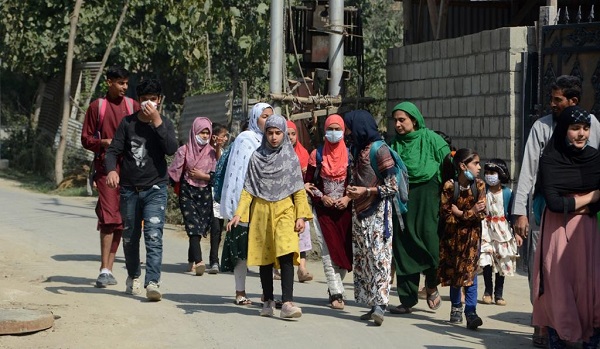Srinagar, (Samajweekly) The Golden Card meant to provide advanced health care facilities to the people is among the many prominent pro-people schemes launched by the Jammu and Kashmir government after the abrogation of Article 370 on August 5, 2019.
The government launched AB-PMJAY SEHAT scheme in convergence with the Central Government’s AB-PMJAY scheme to provide free of cost ‘Universal Health Insurance Coverage’ up to Rs 5 lakh per family on a floater basis.
After the successful start of this scheme, the government has now launched a public outreach campaign ‘One person one Golden card’ to raise awareness regarding this flagship scheme and enroll maximum people in it.
The ‘One person one Golden card’ campaign targets the distribution of 58 lakh Golden cards under the AB-PMJAY & AB-PMJAY-SEHAT health insurance schemes, among the beneficiaries by organising special camps at the Panchayat level. The aim is to cover the poor families from rural backgrounds and ensure greater coverage with easy access to affordable healthcare facilities during health emergencies.
Among the 10-point campaign, specific focus has been laid to step up the targeted delivery of healthcare schemes for the poor and to ensure 100 per cent saturation of eligible beneficiaries in a mission mode.
Even though the State Health Agency is currently organising ‘Gaon Gaon Ayushman’, wherein ‘Golden card’ generation drive is closely monitored right from the Panchayat level, the ‘One Person One Golden Card’ campaign fixes a tangible target for covering the remaining 58 Lakh population in the scheme.
Under AB-PMJAY SEHAT scheme, an Ayushman Golden Card is provided to the beneficiary through which the government and private hospitals selected under the scheme can get free treatment upto Rs 5 lakh.
There is no cap on family size and age as this health cover is inclusive for all. Moreover this scheme holds women, children especially girls and those over 60 in special regard. The scheme provides those in need to get secondary healthcare benefits offered by specialists like cardiologists and urologists. Moreover, advanced medical treatment like that for cancer, cardiac surgery and others is also covered.
As per the data available, till date 60 lakh Golden cards have been generated and 16.36 lakhs (80 per cent) families have been registered with at least one family member verified under PM-JAY and AB-PMJAY-SEHAT Scheme.
Removing the burden out-of-pocket expenses, PMJAY aims to make the entire process of paying for healthcare cashless. All public and empanelled private hospitals have been directed to not charge any extra payment for medical care from all PMJAY beneficiaries to reduce corruption or delay in services.
Under AB-PMJAY and AB-PMJAY SEHAT, during the current policy period, 1,47,582 cases have already been benefited amounting to Rs 221.66 crore, out of which Rs 129.83 crore have already been paid to the hospitals by the insurance company, thus ensuring free of cost specialised treatment to all.
Additionally, the beneficiaries under this scheme can seek treatment across India. This scheme covers pre-existing illness and makes mandatory treatment in all public hospitals. Since the scheme covers such a large population, it will be purchasing services from private healthcare providers. This scheme also encourages the production of more affordable healthcare equipment and drugs.
In another move, the Jammu and Kashmir administration has approved the remission of 50 per cent stamp duty for all first time buyers of real estate in the housing sector for a period of two years.
The decision is aimed at giving a boost to the real-estate sector in Jammu and Kashmir and motivating the new buyers to participate in the market. It is also expected to provide momentum to property sale and registration by making the purchase of property attractive and affordable.
But notwithstanding, the People’s Alliance for Gupkar Declaration (PAGD) which is a conglomerate of political parties with the common aim of reversing the constitutional changes made to Jammu and Kashmir on August 5, 2019 has put out a white paper to counter BJP’s claims on peace and development post revocation of Article 370.
With top leadership of the country already having made it clear that elections to Jammu and Kashmir will be held after the delimitation process gets completed, the question many are asking is — will the schemes launched by the government give a sense of relief to the people or merely provide ammunition to the parties opposed to the revocation of Article 370 to hit out at the government.










